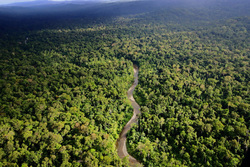Palm oil firm Digoel Agri said to clear Papuan forest without Indigenous consent
by Hans Nicholas Jong
- A palm oil conglomerate has begun clearing the ancestral forests of Indigenous tribes in Indonesia’s Papua region without the locals’ consent, a watchdog group says.
- Subsidiaries of the Digoel Agri group have cleared 64 hectares (158 acres) of forest in the first two months of 2021, according to satellite imagery analyzed by Pusaka, an Indonesian nonprofit.
- Digoel Agri had cleared 164 hectares (405) acres in 2019, before suspending operations for all of last year amid a labor dispute.
- Pusaka alleges that Digoel Agri has failed to obtain the free, prior and informed consent of local Indigenous tribes to operate in the area, which forms part of the Tanah Merah project, slated to become the world’s biggest oil palm plantation.
JAKARTA — After halting forest-clearing operations in 2020, the Digoel Agri conglomerate has apparently restarted its activities in Indonesia’s Papua province, raising alarms among local Indigenous communities who say they never agreed to its presence on their ancestral lands.
Satellite imagery from the first two months of 2021 shows 64 hectares (158 acres) of deforestation in two Digoel Agri concessions, those held by its subsidiaries PT Boven Digoel Budidaya Sentosa and PT Perkebunan Boven Digoel Sejahtera, according to forest monitoring platform Nusantara Atlas.
Pusaka, an Indonesian nonprofit that analyzed the satellite imagery, says it has heard from local villagers that the conglomerate’s land-clearing contractor started bringing heavy equipment into the area in November 2020.
In 2019, Digoel Agri cleared 164 hectares (405 acres) of forest, before pausing operations in October that year, when it reportedly stopped paying staff salaries.
The concessions form part of the Tanah Merah project, a vast area on the island of New Guinea earmarked to become the world’s largest oil palm plantation. The project lies in the heart of the world’s third-largest rainforest, after the Amazon and Congo.
Development on the project has only just begun, but if it is carried through to completion, it will result in the clearance of 280,000 hectares (692,000 acres) of rainforest, releasing a huge amount of carbon dioxide into the atmosphere.
The project has been mired in controversy, such as allegations of falsified permits, conflicts with Indigenous peoples, and the use of shell companies in offshore secrecy jurisdictions to conceal the identifies of the investors behind the project, several of which remain a mystery.
Digoel Agri was founded by the family of the late Ventje Rumangkang, a founder of Indonesia’s Democratic Party who died last year. They have partnered with a New Zealand property developer named Neville Mahon, who in 2018 became the majority shareholder in the Digoel Agri subsidiaries. Neither party replied to a request for comment.
A report from Pusaka includes allegations that Digoel Agri has failed to obtain the free, prior and informed consent of local Indigenous tribes.
“The ancestral forests that have important value for their livelihoods and cultures will be gone” if the project continues, Pusaka director Franky Samperante told Mongabay, adding that the group had been unable to obtain copies of permits held by Digoel Agri.












